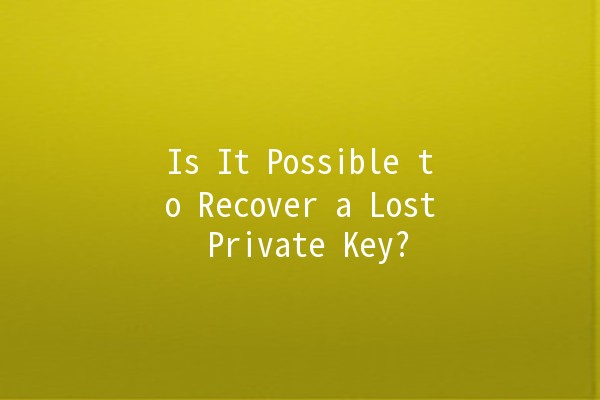
In the world of cryptocurrencies and blockchain technology, private keys are paramount. They serve as the gateway to your digital assets, allowing you to sign transactions and prove ownership. However, losing a private key can be a nightmare for any crypto owner. This article explores the implications of losing a private key, whether recovery is viable, and practical strategies to safeguard your assets.
Understanding Private Keys
Before diving into the options available for recovery, it's crucial to understand what a private key is. A private key is a long string of alphanumeric characters that functions as a digital signature for blockchain transactions. It is secret and should only be known to the owner. When a private key is lost, access to any cryptocurrency tied to that key is irreversibly lost, as there are no "reset" options available like you may find with traditional online accounts.
The Importance of Private Keys
Ownership: Your private key proves that you own your cryptocurrency.
Security: Only you should know your private key; sharing it can compromise your security.
Control: Losing access means losing control; no one can help you recover funds.

Can You Recover a Lost Private Key?
The short answer is that it is generally impossible to recover a private key if it has been lost. The cryptographic nature of blockchain technology is designed to resist hacking and unauthorized access. However, there are a few scenarios where partial access might be regained or alternative solutions offered:
Let's discuss these scenarios in detail.
Explanation:
If you've previously created a backup of your private key, recovery is much simpler. Backups can be created in various formats, including paper, USB drive, or cloud storage.
Practical Application:
Paper Wallets: When generating a paper wallet, write down your private key and store it in a secure location.
USB Backup: Save your private key on a USB drive and ensure it's kept in a safe physical location.
Explanation:
Many wallets, especially mobile or software wallets, provide a mnemonic phrase made up of 1224 words. This phrase acts as a master key to recover your private keys.
Practical Application:
Storage: Write this phrase down on paper and store it securely. If your wallet is lost or deleted, you can restore it using this phrase.
Verification: Regularly verify that the phrase is intact and stored securely.
Explanation:
If you’ve been using a wallet client, some may offer features that allow you to restore access using your email or username. This could mean that portions of your wallet may still be retrievable even if the private key is lost.
Practical Application:
Session Recovery: Log into your wallet client and check for any recovery tools they offer. This may include contact support for additional options.
Practical Tips for Enhancing Security and Recovery Options
To avoid the hassle of losing access to your cryptocurrency in the future, here are five practical solutions:
Explanation:
Hardware wallets are physical devices designed to store your private keys securely.
Practical Application:
Investing in a reputable hardware wallet (e.g., Ledger, Trezor) greatly reduces the risk of loss through cybersecurity threats and provides robust backup solutions.
Explanation:
A multisignature wallet requires multiple keys to authorize a transaction, adding an additional layer of security.
Practical Application:
Set up a multisignature wallet for your most valuable assets. For instance, with a 2of3 wallet, two out of three keys must be used to access funds, providing an additional safeguard.
Explanation:
Regularly back up your wallet data, especially if you use a software wallet.
Practical Application:
Schedule periodic backups and store them securely. Utilize encrypted storage methods to keep your keys safe from unauthorized access.
Explanation:
Offline storage options like cold wallets ensure that your private keys are not exposed to the internet.
Practical Application:
Use paper wallets or hardware wallets for longterm savings and transactions. This reduces exposure to hacking attempts.
Explanation:
Understanding the importance of private keys and the dangers of losing them is crucial.
Practical Application:
Regularly educate yourself about the best practices in cryptocurrency management, participatory forums, and attending workshops.
FAQs About Private Key Loss and Recovery
If you lose your private key, you lose access to your cryptocurrency. There is no way to regain access unless you have a backup or recovery phrase.
Most software solutions specifically do not recover lost private keys, as the private key cannot be reconstructed. However, they may facilitate recovery from backups or phrase recovery.
A blockchain explorer can only show you transactions associated with your public key, but it won't help recover or regenerate your lost private key.
It's recommended to back up your wallet every time you make significant changes, such as after major transactions or changes in your wallet settings.
If you forget your mnemonic phrase, recovery options become limited to any backup solutions you might have. It’s vital to store it securely.
Storing your private key in cloud storage can expose you to significant risks such as hacking. It’s recommended to use more secure, offline methods.
, while losing a private key usually means losing access to your cryptocurrencies indefinitely, employing best practices can help avoid such situations. Always back up your keys and consider investing in hardware wallets to enhance security and peace of mind. As the world of cryptocurrency continues to expand, knowledge and preparation will be your best allies in maintaining control over your digital assets.

